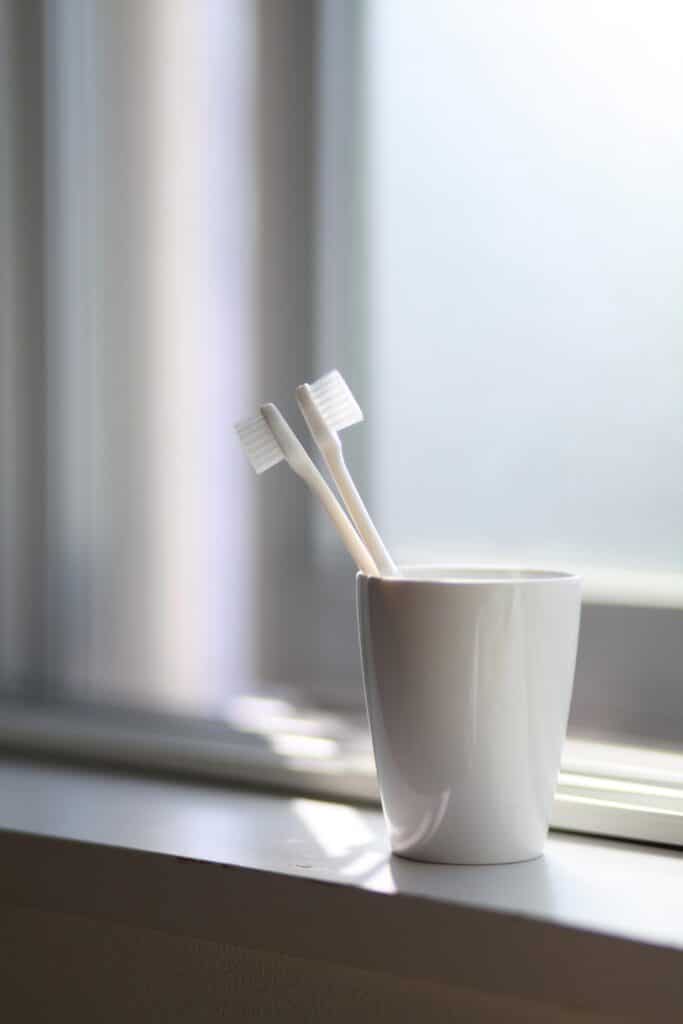In lockdown or during self-isolation, the days can blend and certain things end up taking a back seat.
A healthy diet and exercise are the obvious victims of being housebound, but we’ve also seen complacency set in when it comes to good oral hygiene. In fact, a report back in August 2020 found that only 1 in 8 Brits were brushing twice daily.
So, how do you look after your teeth during lockdown? Simple. Build it into your daily routine, set reminders on your phone or use an app like Brush DJ (which sends notifications and lets you brush along to your favourite songs), and make sure you do the following:
How to look after your teeth in lockdown or self-isolation
- Brush twice daily. Brushing twice a day is the recommended amount, with each session lasting for around two minutes. Make sure you brush your teeth with fluoride toothpaste and spit after brushing — but don’t rinse your mouth with water or mouthwash straight away. This will wash away the fluoride before it has a chance to get to work.
- Use mouthwash. At a separate time to brushing, use an alcohol-free mouthwash to reach all those nooks and crannies that your brush couldn’t find. Swish 10ml around your mouth, teeth, and gums for about a minute before spitting.
- Remember to floss. To lower the risk of gum disease, make sure you add flossing or interdental brushing to your oral hygiene routine. This is crucial for dealing with the plaque buildup between your teeth that brushing alone won’t remove.
- If you have braces or aligners, continue with your aftercare routine. Lockdown can be a challenging time if you’re undergoing orthodontic treatment, but you must stay the course. Follow your specialist orthodontist’s recommendations to the letter. Want to learn more? Read this article: How to look after your braces while self-isolating.
- Cut down on the sugary stuff. It’s all too easy to seek comfort in food at a time like this, with sugary foods and drinks a clear favourite. Make sure you’re not overdoing it, though, or your teeth could suffer. And you must avoid sugary stuff at bedtime, as this can increase the risk of tooth decay.
- Stop smoking. Finally, if you smoke, try to cut down or quit. Smoking increases your chances of developing gum disease and mouth cancer. Visit the NHS stop smoking services to get started.
What if you have a dental emergency during lockdown?
If you experience a dental emergency during lockdown, there are a few things you need to do:
- First, do not go to A&E unless your problem is affecting your breathing, ability to swallow, or vision. Instead, call your local dental practice and follow their instructions.
- If your emergency is out-of-hours, call 111. If you need to be seen by a dentist urgently, this can be arranged.
- In the meantime, you can manage your pain using over-the-counter painkillers, such as paracetamol or ibuprofen. Remember to always read the label.
What is considered an emergency?
The following would be considered dental emergencies:
- Swelling (gum, cheek, or face) which is spreading
- Mouth ulcers which haven’t healed after two weeks
- Broken or knocked-out tooth or teeth
- Bleeding which lasts for more than 20 minutes following a recent tooth extraction
- Damaged braces which put you at risk of inhaling a loose part
COVID considerations when visiting your dental practice
If you need to visit your practice, please make sure you observe the following guidelines:
- Only the patient and a chaperone (if required) is allowed in
- Attend at the time given — you will not be admitted if you’re early or late
- Wear a mask when entering the practice and throughout your visit (treatment aside)
- Use hand sanitiser on arrival
- Keep your hands clean and wash them regularly
- Carry tissues with you to catch coughs and sneezes
- Try to avoid close or direct contact
Please do not visit the practice if you:
- Have any symptoms: cough, fever, or shortness of breath – even if they’re mild
- Have been in contact with someone who is now displaying symptoms or self-isolating
- Fall into a vulnerable category as defined by the UK Government
It’s never been more important to keep your teeth healthy
There’s no denying this is a tough time for everyone, but you can’t let it affect your oral health. Taking care over what you’re putting in your mouth and how it impacts your teeth can often be the first step towards a healthier, happier lifestyle overall. And don’t forget to brush twice a day!


